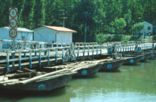The Po river from Cremona to Mantua
There's more to the Po river than mist and mosquitoes. Join us as we follow the great river from Cremona to Mantua and discover a world of hidden delights
 We'll not attempt to cover 652 kilometres of waterway in three paragraphs, preferring to take you along the stretch of the Po that runs between Cremona and Mantua, both of which deserve a visit in the own right.
We'll not attempt to cover 652 kilometres of waterway in three paragraphs, preferring to take you along the stretch of the Po that runs between Cremona and Mantua, both of which deserve a visit in the own right. So let's leave Cremona - famous, among other things, for its nougat - behind and follow the Po south towards Casalmaggiore, one of the many charming towns dotted along the Great River, and home of its own brand of salami, cotechino (a pork belly sausage) and an unusual Costume Jewellery Museum. The museum is housed in Casalmaggiore's old Barnabite College and boasts a collection of over 35,000 pieces including earrings, brooches, bracelets, cufflinks, medals, cigarette cases, compact cases, badges and work tools which trace more than 50 years in Italian fashion accessories. Indeed, for decades the town was one of Italy's most important producers and exporters of costume jewellery.
Before leaving do find time to try some mostarda and a plate of marubini (a fresh filled pasta), two of the specialities of the area.
As the Po winds east we come upon Viadana - the melon capital of Italy and the biggest council district in the Mantua area. The town is famous for its Parazzi Archaeological Museum, with important Etruscan, Roman and Egyptian remains and pottery and frescoes taken from some of the magnificent villas in the area.
Nature lovers should head for the Torbiere di Marcaria nature reserve, once a turf bog and now home to herons, owls, marsh-harriers and numerous other animals.
Gourmets will want to taste some of the area's fine Lambrusco, a deep red full-bodied wine which - as the locals say - ‘is a wine that'll stain your tablecloth’. Try it with the local speciality of snails and frogs.
 On your bike
On your bikeThe area is ideal for cyclists as there is a wide variety of cycle paths to bring you into the heart of the countryside. We chose two, one for those who prefer to take things more slowly and the other for the seasoned cyclist who likes to put him or herself to the test. The first route takes us gently from Lido di Casalmaggiore, along the edge of Nascituri forest and touching on the Golena del Po nature park on the way. We return to base via the main bank, making our way through rows of elms and past tiny churches.
Hardened cyclists will prefer to head down the river bank between Viadana and Conca di Governalo, where the Mincio flows into the Po. Look north towards Mantua where the rivers meet and discover the delights of the Mincio Regional Park, the beautiful natural backdrop to some of the most interesting villas of the Gonzaga period.